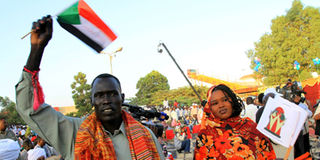South Sudan begins registration for independence referendum

A Sudanese man and woman walk together during a mass wedding of some 1000 couples in what has been dubbed the "Marriage of Unity" on November 13, 2010, in the Sudanese capital Khartoum, where men and women from the north and south of the country tied the knot. The wedding ceremonies come just two months prior to a referendum on the self-determination of Southern Sudan. AFP PHOTO/ASHRAF SHAZLY
KHARTOUM, Sunday
Voter registration for a January referendum in south Sudan kicks off on Monday across the country and abroad, launching a process which could lead to the partition of Africa’s largest country.
About five million southern Sudanese are called to add their names to the electoral list between November 15 and December 1.
A referendum commission has set up almost 2,800 registration centres, with all but 165 located in the south. Southerners living in the north, estimated to number anywhere between 500,000 and two million, are entitled to vote.
The United Nations has provided logistical support by transporting registration forms across both countries, especially to remote areas.
“We are fairly ready,” said Denis Kadima, director of the UN Integrated Referendum and Electoral Division.
“There may be some delay here and there, but as far as we are concerned we have been able to supply to the commission everything that they need well in time.”
The electoral commission has employed more than 10,000 staff, or three employees for each centre, plus administrative staff, for the registration process, which is to be mainly carried out on an ethnic basis.
While the logistics may be in place, the question of eligibility is far from clear-cut, and could yet prove a major headache for the commission.
Those aged 18 or over belonging to a tribe established in the south on or before January 1, 1956, the date of Sudan’s independence from Britain, are eligible to vote.
Also eligible are those not residing in the south but whose ancestors come from a tribe which meets the same criterion, as well as those who have lived in southern Sudan without interruption since 1956.
However, the referendum commission has not drawn up a definitive list of southern tribes, many southerners do not have official documents proving their origins, and an unknown number of northerners have ancestors from the south.
While the registration process is expected to go smoothly in the south, the situation in the north could prove complicated.
“We do not know at this stage if all the registration staff have understood what was taught to them in the training in a consistent manner,” said the UN’s Kadima.
He admitted that the vote date of January 9 was “based on a best case scenario. Once we have the worst case scenario it will become very difficult... sticking to the timeline.”
The United Nations and the Carter Foundation are observers in the registration process. The International Organisation for Migration (IOM) is to oversee registration of Sudanese abroad, with centres in eight countries: Australia, Britain, Canada, Egypt, Ethiopia, Kenya, Uganda and the United States.
But a delay is expected in Egypt, home of the largest Sudanese community in diaspora, because the authorities there have yet to give a green light to the IOM, said George Benjamin, spokesman for the referendum commission.
Meanwhile, the Sudanese army on Sunday accused the armed forces of southern Sudan of aiding Darfuri rebels, a day after clashes in a region between the country’s north and south close to Darfur.
On Friday, the Sudanese army clashed with fighters of the Justice and Equality Movement (JEM) near Al-Meirem, a sector bordering the south’s North Bahr al-Ghazal and the north’s South Kordofan, an army spokesman said.
South Kordofan is a state of central Sudan strategically located between the south of the country and Darfur.
“The JEM fled from the southern side of the border and was received by the Sudan People’s Liberation Army (SPLA),” Khartoum’s army spokesman Sawarmi Khaled Saad told AFP.
“The SPLA evacuated the JEM’s wounded towards the towns of Juba, Yei and even to Uganda.
‘‘This is unacceptable,” said Mr Saad.




